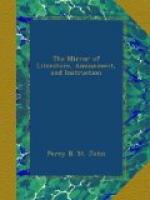Bolivar, alleging that Miranda had betrayed his country by capitulating to Monteverde, arrested him at La Guayra. Bolivar then demanded his passport, and when taken before Monteverde, the Spanish general said that Colonel Bolivar’s request should be complied with, as a reward for his having served the king of Spain by delivering up Miranda. Bolivar answered that he arrested him to punish a traitor[2] to his country, and not to serve the king. This answer had nearly included him in the general proscription; but the good offices of Don Francisco Iturbe, secretary to Monteverde, procured the passport, and Bolivar was allowed to sail for Curacoa. From that island he went to Carthagena, where he obtained the command of a small force, with which he proceeded up the Magdalena, and having beaten parties of the royalist troops at various points on that river, he continued his march from Ocana to Cucuta, and solicited assistance from the government of Cundinamarca. Five hundred men were placed at his disposal, and with these, added to his own small party, Bolivar undertook to effect the liberation of his country. Four thousand Spaniards, under General Correa, were then on that part of the Venezuelan frontier. A division of these was beaten by Bolivar, who pursued his march to Truxillo, defeating on the way several royalist detachments.
[2] Bolivar seems to have been hurried
into a dreadful error by the
warmth of
his feelings. Not only is the expediency
of the
capitulation
admitted by eye witnesses of the first
respectability,
but also that Miranda had no other alternative.
The rich
and influential inhabitants withheld their support,
not
that their
political sentiments had undergone a change but
because
they saw the useless of sacrificing property and life
in
a wild attempt
to stem the stream of public opinion; the bulk of
the people
having become decidedly royalist in principle ever
since that
earthquake, which had been represented by the
priesthood
as a judgement of Heaven upon the insurgent cause.
The Spaniards from the commencement of the war, had put to death all persons whom they found with arms in their hands. The South Americans, on the contrary, gave quarter to those royalists who fell into their power. The natives consequently preferred entering the royalist ranks, feeling secure that, in case of being made prisoners, their lives would be spared. Bolivar, perceiving the great disadvantage under which he laboured, and as a retaliation for the horrid butcheries committed by the Spaniards, issued a proclamation at Truxillo, declaring, that from that time forward he should wage a war of extermination. This declaration of guerra a muerte on the part of the independents made the danger, in that respect, equal on both sides.




